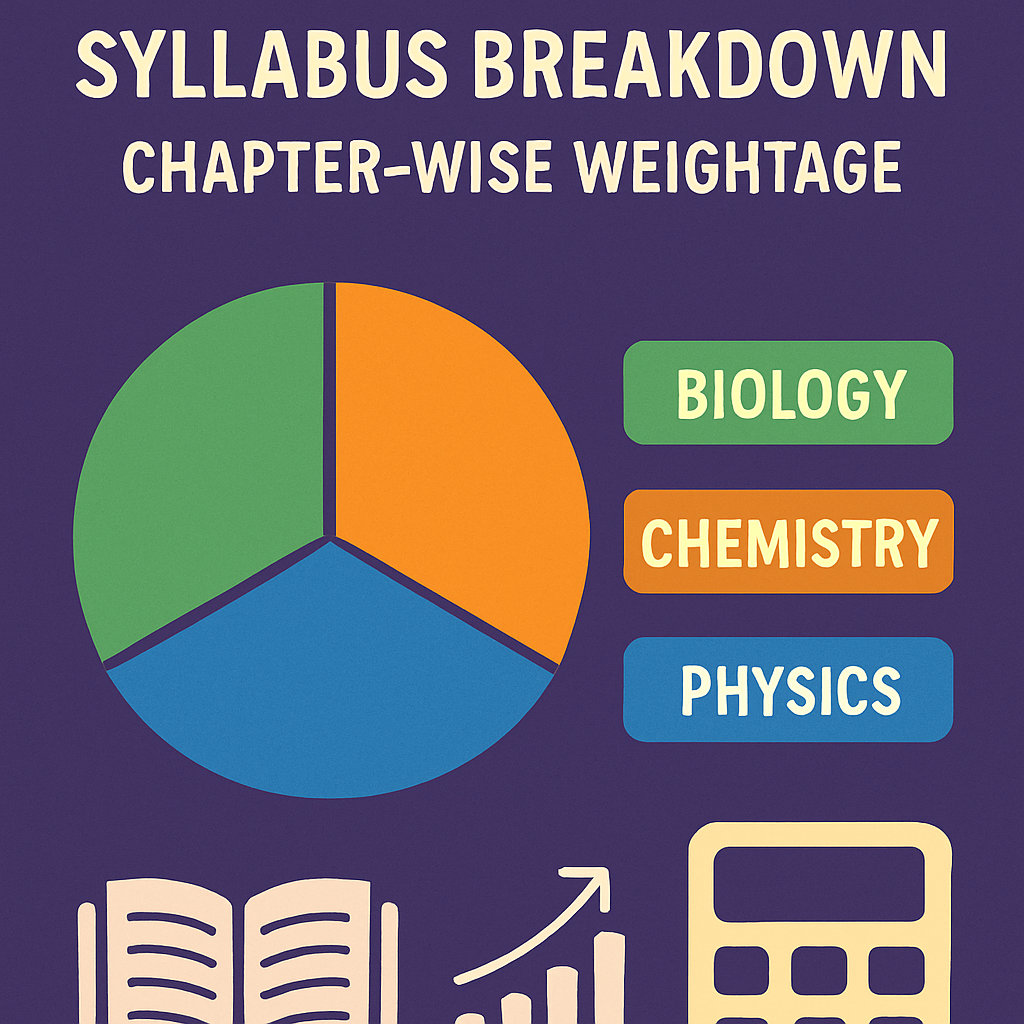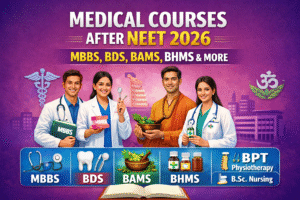NEET (National Eligibility cum Entrance Test) is a high-stakes examination with a vast syllabus across Physics, Chemistry, and Biology (Botany + Zoology). Understanding chapter-wise weightage helps you prioritize high-yield topics and allocate study time effectively.
How the Weightage Works
Topics are often asked repeatedly across past exams.
Weightage patterns typically remain stable year-to-year.
While official body doesn’t release exact weightage per chapter, approximate data is inferred through past year analysis (2019-2025).
This breakdown helps predict NEET 2026 trends and prepare strategically.
Biology (Botany + Zoology)
| Unit | Chapters (Selected High-Weightage) | Approx. Weightage (%) |
|---|---|---|
| Diversity in Living World | Plant Diversity, Animal Classification | 6–8 |
| Structural Organization | Plant/Animal Tissues | 4–6 |
| Cell Biology | Cell Cycle, Biomolecules | 5–7 |
| Genetics & Evolution | Heredity, Molecular Basis, Evolution | 12–15 |
| Plant Physiology | Transpiration, Photosynthesis, Respiration | 8–10 |
| Human Physiology | Digestive, Circulatory, Nervous, Reproductive Systems | 15–18 |
| Ecology | Ecosystem, Biodiversity, Environmental Issues | 6–8 |
| Reproduction | Sexual & Asexual, Human Reproduction | 7–9 |
Strategy Tip: Focus heavily on Genetics & Human Physiology, which consistently fetch the highest number of questions.
Chemistry
Physical Chemistry
| Chapters | Approx. Weightage (%) |
|---|---|
| Mole Concept & Stoichiometry | 5–7 |
| Thermodynamics | 6–8 |
| Chemical Equilibrium & Ionic Equilibrium | 6–10 |
| Electrochemistry | 5–7 |
| Solutions & Colligative Properties | 4–6 |
Inorganic Chemistry
| Chapters | Approx. Weightage (%) |
|---|---|
| Periodic Table & Periodicity | 6–8 |
| Chemical Bonding & Molecular Structure | 8–10 |
| Coordination Compounds | 4–6 |
| p-Block, d-Block & f-Block Elements | 6–8 |
| Metallurgy & Environmental Chemistry | 4–6 |
Organic Chemistry
| Chapters | Approx. Weightage (%) |
|---|---|
| Basic Concepts & Hydrocarbons | 6–8 |
| Functional Groups (Alcohols, Ethers, Aromatics) | 8–10 |
| Carbonyl Compounds, Carboxylic Acids & Derivatives | 6–8 |
| Biomolecules, Polymers, Chemistry in Everyday Life | 6–8 |
Strategy Tip: Prioritize Equilibrium, Bonding, Organic functional groups, as these are high-yield in Physics too.
Physics
| Chapters | Approx. Weightage (%) |
|---|---|
| Mechanics (Laws, Rotational, Gravitation) | 12–15 |
| Thermodynamics/Kinetic Theory | 6–8 |
| Waves & Oscillations | 4–6 |
| Electrostatics & Current Electricity | 8–10 |
| Magnetic Effect of Current & Magnetism | 6–8 |
| Electromagnetic Induction & AC | 6–8 |
| Optics (Ray & Wave) | 8–10 |
| Modern Physics (Photoelectric Effect, Nuclear Physics, Dual Nature) | 10–12 |
| Semiconductor Electronics | 4–6 |
Strategy Tip: Mechanics, Modern Physics, and Optics often pack the highest number of questions—make sure they’re bulletproof.
High-Yield Study Strategy
Analyze past 3–5 years’ question papers to spot recurring chapters.
Allocate study time proportional to weightage.
Use active recall & spaced repetition for memory-intensive chapters.
Solve topic-wise quizzes and tweak strategy based on strengths/weaknesses.
Practice mixed full-length mocks under timed conditions.
SEO Best Practices in This Article
Title includes key phrase: NEET 2026 Syllabus Breakdown – Chapter-Wise Weightage.
Subheadings are clear and include target keywords (e.g., Biology Weightage, Chemistry High Yield, NEET 2026).
Use of lists, tables, bullet points for readability and SEO scanning.
FAQ section addresses common queries which also boost SEO via long-tail keywords.
Frequently Asked Questions (FAQ)
Q1. Is this the official NEET 2026 syllabus weightage?
No, these are estimated weightage patterns deduced from analysis of past exam papers (2019–2025). The National Testing Agency does not officially publish chapter-wise weightage.
Q2. What are the most important chapters to focus on?
The chapters with consistently high weightage include Genetics, Human Physiology (Biology); Chemical Bonding, Equilibrium, and Organic functional groups (Chemistry); Mechanics, Modern Physics, and Optics (Physics).
Q3. How can I prioritize topics effectively?
Distribute study hours based on weightage: high-weightage chapters deserve deeper focus. Combine this with topic-wise practice and periodic revision.
Q4. Should I completely skip low-weightage chapters?
Not recommended—while you may give them less time, ensure fundamental understanding. Sometimes exams include surprise questions.
Q5. How frequently should I revise each chapter?
Use spaced repetition: revise high-yield chapters every week, moderate-yield alternate weeks, and lighter topics once in a while or before mocks.
Q6. Do these weightages change over years?
Trends tend to remain stable, though slight fluctuations occur. Regular past-paper analysis is key to staying updated.







